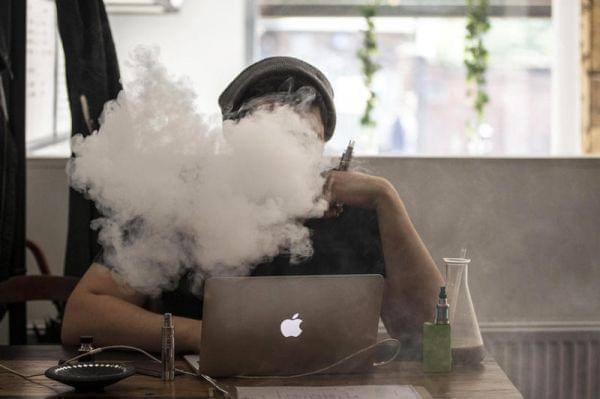FDA Cracks Down On Teen Vaping, ‘Juuling’

Dan Kitwood/Getty Images
The Food and Drug Administration announced Tuesday they will take steps to crack down on the sale of e-cigarette products to children and teenagers. More than two million middle and high school students used e-cigarettes in 2016 and that number has continued to grow.
FDA Commissioner Scott Gottlieb said the agency is conducting an undercover, nationwide blitz this month to try and stop the sale of e-cigarette products from companies like JUUL to minors.
He said since March, FDA compliance checks uncovered 40 violations for illegal sales of JUUL-brand e-cigarettes to children. The companies, which include gas station convenience stores in both Indiana and Kentucky, have received warning letters.
“Let me be clear to retailers,” Gottlieb wrote. “This blitz, and resulting actions, should serve as a notice that we will not tolerate the sale of any tobacco products to youth.”
JUUL Labs is one of the companies the FDA is targeting. The company produces an e-cigarette device that’s about the size of a thumb drive. It comes in a variety of flavors, some decorated with cartoon characters and a single device can contain as much nicotine as a pack of cigarettes. Although the devices are not legally available to minors, “juuling” has gained popularity among teens recently. Similar brands are sold under the names of myblu and KandyPens.
He said the FDA also sent a letter to JUUL Labs Tuesday requesting documents that could help the agency better understand the high rates of use among minors and what’s driving its appeal among teens and children.
In a statement provided to Side Effects Public Media, a spokesperson for JUUL Labs said the company “agrees with the FDA that illegal sales of our product to minors are unacceptable.”
“We already have in place programs to prevent and, if necessary, identify and act upon these violations at retail and online marketplaces,” the statement from JUUL said.
On Wednesday, the company announced it will take additional actions to combat underage use of its products. JUUL Labs “recognizes that young people have become aware of and gained access to its products” and will actively support state and federal initiatives to raise the minimum age to purchase tobacco products to 21.
JUUL also said it will invest $30 million over the next three years in independent research on the “scientific and societal implications” of vapor products and to support youth and parent education and community engagement efforts.
“We are working with the FDA, lawmakers, parents and community leaders to combat underage use, and we will continue working with all interested parties to keep our product away from youth."
The FDA’s action came in response to last week’s letter from 11 U.S. Senators, including Democrat Dick Durbin of Illinois, calling on the FDA to ban candy and fruit flavorings in e-cigarettes and cigars.
The letter states that JUUL Labs has been marketing cigarettes and tobacco products “aggressively” to children.
“It is no secret that big tobacco companies will stop at nothing to hook young people on their addictive and dangerous products,” Durbin and the senators wrote to FDA’s Commissioner. “If companies want to use flavors, they should be required to demonstrate to the FDA that use of flavors will benefit public health. If we wait four more years to act, we will have doomed countless more children to addiction and adverse health consequences at the hands of big tobacco companies.”
A 2017 study in the journal Pediatrics found e-cigarette devices could cause teenagers to develop nicotine addiction that leads some to take up smoking tobacco cigarettes.
Following FDA’s announcement, Sen. Durbin said he’s pleased to see the FDA take these actions to “protect our kids from falling into a lifetime of addiction.”
He said that while fewer teens are getting hooked on tobacco products, they are increasingly turning to vaping and e-cigarette companies know this.
"Though they tell us, 'We're not interested in kids,' they come up with bubblegum-flavored vaping, mango-flavored JUULs, all these sorts of things clearly designed to appeal to kids,” he said. “We said to the FDA, 'Call them on it,’ and they finally did."
In 2016, the FDA asserted the right to regulate e-cigarettes as tobacco products. But the agency decided to delay regulations until 2022 as part of a plan to overhaul tobacco regulations. The senators, who wrote the letter, are calling on the FDA to end the delay and remove kid-friendly e-cigarette and cigar flavorings from the market.
Tuesday’s FDA announcement states these new efforts are part of the agency’s Youth Tobacco Prevention Plan that aims to prevent young people from using tobacco products, including e-cigarettes.
UPDATED on April 25, 2018 to include information about a new JUUL initiative to combat underage e-cigarette use and a quote from Sen. Dick Durbin in response to the FDA’s announcement.
This story was produced by Side Effects Public Media, a news collaborative covering public health.
Follow Christine on Twitter: @CTHerman

